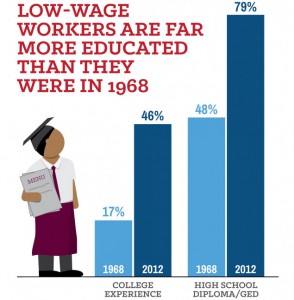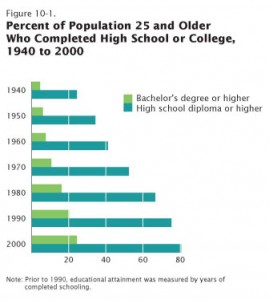 It is a widely held assumption that higher levels of education are associated with higher paying jobs. This data has long been used to argue for the vale of higher education.
It is a widely held assumption that higher levels of education are associated with higher paying jobs. This data has long been used to argue for the vale of higher education.
A new study by the Economic Policy Institute finds that low-wage workers (those in the bottom 20% of income) have far more education now than they once did. More specifically, the percent of low-wage workers with varying levels of educational attainment has shifted a great deal from 1968 to 2012, including
- percent with a high school degree rose by 31% (from 48% to 79%), and
- percent with at least some college education rose by 29% (from 17% to 46%).
So What?
 According to U.S. census data, educational attainment levels rose significantly during that time period. Put differently, a better comparison of low-wage workers across time would compare their educational attainment to the average educational attainment of the population aged 25 and older.
According to U.S. census data, educational attainment levels rose significantly during that time period. Put differently, a better comparison of low-wage workers across time would compare their educational attainment to the average educational attainment of the population aged 25 and older.
Our low-wage workforce is more educated today than ever before, but so also is our workforce in general. Additionally, higher educational attainment remains correlated to higher income levels and lower levels of unemployment.
While all of this information is important, it considers only one positive benefit of education: higher paying jobs (with a greater likelihood of employment). Education, however, must be about more than the ability to acquire and retain meaningful employment. As a person of faith, what additional reasons do you have for advocating for continuing to increase the average level of educational attainment in this country and in the world?